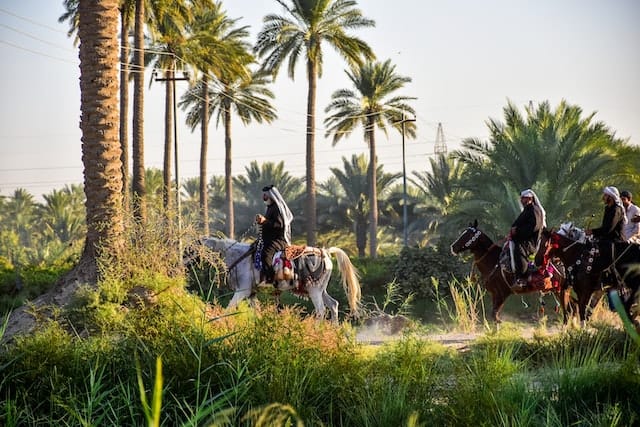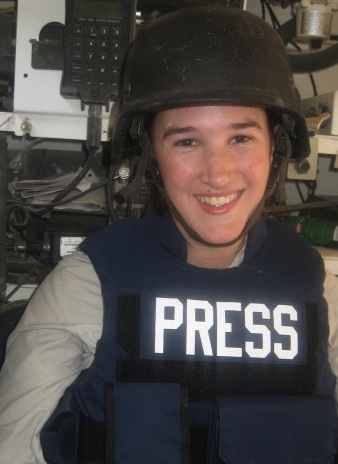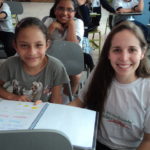Woman in the War Zone: In Conversation with Iraq War Correspondent Megan Greenwell

As a new reporter on the Columbia Daily Spectator, I looked up to Megan Greenwell. In 2006, Megan was the editor of the daily paper, and aside from being intelligent and witty, she commanded a high level of attention and respect. She was one of the first women I saw in a high position of power, and she made it clear that confidence was a prerequisite for the position. Everyone on that staff lived and breathed the Columbia Daily Spectator, spending dusk until dawn editing and putting the paper to bed because almost everyone there dreamed of becoming a top-notch journalist at a big-name paper covering the hottest stories of the day. When only a few years after graduating, Megan became the Washington Post correspondent for the Iraq War, many were impressed, but no one was surprised.
Woman in the War Zone: In Conversation with Iraq War Correspondent Megan Greenwell
Rachel Sales: What led you to become the Washington Post correspondent for the Iraq War?
Megan Greenwell: I had started as an intern [at the Washington Post] in 2006, and in 2007, they put out a call for volunteers to go to Baghdad. At that time, the war was four years old and they had cycled through the people who had wanted to go, and people with kids weren’t going to go at all so I just sort of put my hand up and they ended up sending me in the summer of 2007. In the beginning they said, “I don’t know, you may be too young.” I was 23 at the time. And then they kind of got desperate and said, “Okay, we’ll send you after all.”

RS: What were your concerns before taking the job, if any? What sort of reactions did you get from friends and family members upon taking the position?
MG: I was not particularly hesitant about it. Covering stories like that was kind of the reason I got into journalism in the first place, the desire to cover the biggest story at the time. I was thrilled about it. Telling family and friends was not the easiest thing. My mom was not thrilled. I got a lot of questions about safety procedures and stuff like that. My editors were always very good in saying, “If you have any friends who are worried, have them call me.” You certainly cannot guarantee safety in a place like that, but you can take a lot of steps [to advance it], and the Post was always good about doing everything in their power to protect their people. It was reassuring to know that they were doing everything they could, and my mom understood that and my family and friends understood that this was why I had gotten into journalism.
RS: It must have felt like hitting the jackpot.
MG: I didn’t think I’d have that opportunity that early [in my career], so when it came up, I said, “Yes, absolutely.”
RS: Did you ever feel like you were in danger while reporting from Iraq? If so, what were the circumstances?
MG: There were definitely dangerous situations. There was a fairly constant low-level danger and an occasional high-level danger even when we were in our house in a neighborhood protected by walls. You were always aware that it was not a guarantee that nothing would happen to you. The low-level fear was fairly constant but it was not usually enough to stop working. Occasionally something bad would happen. We had some guys with semiautomatics break into our compound and one of our coworkers heard the commotion going on outside, and we were sent into a safe room.
The guys knew that Americans lived in the house and wanted to kill them. I also did embed with the military, and when you do that, there’s the constant risk of driving over a landmine or a roadside bomb. Or if you’re going on a mission of some sort, there can be a firefight. On every embed, one of the soldiers would always offer me a gun, saying, “We all have guns. You need a gun.” I would say, “No, it’s far worse for me if I have a gun because I’m not trained in that.”
RS: What was it like to consistently experience low-level danger?
MG: It definitely gets exhausting. The standard at the time was that the big media organizations would never have someone there for more than eight weeks so you’d leave for a few days or longer than that for some sort of vacation. That was important because low-level fear can get really exhausting and we were working insane hours, seven days a week. Having that break every once in a while was really useful.
RS: Was there any downtime, and if so, what did you do?
MG: The way the time difference worked out, deadlines were at 2 AM. After that, we would answer some questions from an editor. From 2 AM to 4 AM, we’d play pool and video games. We also had a pool in our backyard so we’d take afternoon breaks. At that time, unless there was a valid reporting issue, we weren’t really allowed to leave [the compound] because it was just too dangerous then.
RS: What sort of precautions did you have to take as a woman reporting from Iraq?
MG: The rules were a little different [for women]. I would have to go out in a headscarf and a long skirt. Sometimes that meant that people couldn’t tell that I wasn’t Iraqi. It was a big advantage. If you can only see someone’s face, it’s a little harder to tell. I’m Caucasian but I’m not the palest person on earth. The person [who reported for the Washington Post in Iraq] before me was pale with blond hair and blue eyes, so we had a different experience. People said that I looked like I was from Kyrgyzstan so there were some advantages and disadvantages. [Being a woman] meant that I could go talk to women, and Iraqi women were reluctant to talk to men so I had an advantage in going to talk to them.
RS: How did you deal with the language barrier?
MG: Translators went everywhere with us. Because I was not going [to Iraq] as my full time gig, I did not do language training. I picked up a bare minimum of Arabic.
RS: As a female reporter in Iraq, did you feel like you got the same sort of access as a man would? What was that like being in a male-heavy environment?
MG: You definitely felt it when you were on a military base. There were so many service members at the time, and the low-level ones were 18-year-old boys basically so I definitely felt some suspicion from them. I definitely ran into some outright sexism as I think any woman who was there probably did, but there was never anything that interfered in a substantial way from just doing my job.
RS: Why did you leave Iraq after four months?
MG: It was scheduled as a short-term rotation, and so I had to think about whether I wanted to do another foreign posting for a longer term. Even though I loved it, I didn’t want to do it full time. It can be hard to have a stable life when you are doing that because you are rotating in and out of places. You don’t really live anywhere. You live in the office, particularly in war postings, and it’s hard to have stable friendships and stable relationships. I wonder if my thinking would’ve been different now. Then, I was in a serious relationship. Now I’m not. I was a few years out of college and having a stable life was something that I was really craving.
RS: What did you do after the position ended?
MG: I came back to DC, went back to the Washington Post, and was in the main office covering nonprofits and philanthropy, which was very, very different.
Woman in the War Zone: In Conversation with Iraq War Correspondent Megan Greenwell.
RS: Did you need time to recover from your experience in Iraq?
MG: Definitely. I took a couple weeks vacation and just hung out in Jordan and then I went to Turkey where I was just traveling and moving freely, which was incredible. I spent some time at my parents’ house and did some self-care recuperation, which was really important. [My editors at the Post] sort of said, “Okay, you are going to finish on this day. Don’t come back until this day.”
RS: Would you ever want to have a position like that again?
MG: I’m in a very different life position now because I’m an editor [at ESPN The Magazine], so on some level, it’s hard to imagine that opportunity coming up in the near future. But if there was an opportunity, I would. It really shifted my work and the way I think about the world.
RS: What kind of advice would you give to other women who are interested in reporting from dangerous regions?
MG: Obviously people need to make these decisions for themselves and it’s not the right move for everyone. A lot of women want to do to it and try to talk themselves out of it. They’re worried about upsetting their friends and family, and they think they should be scared. I think that if those are your objections, you should move past them and do it for sure. It’s definitely not right for everybody, but if it’s a thing that someone wants to do, and if she’s spoken to people who have done it before, then she should not be afraid to make the leap. It is a totally valuable thing.
Top photo credit for In Conversation with Iraq War Correspondent Megan Greenwell by unsplash.com.








